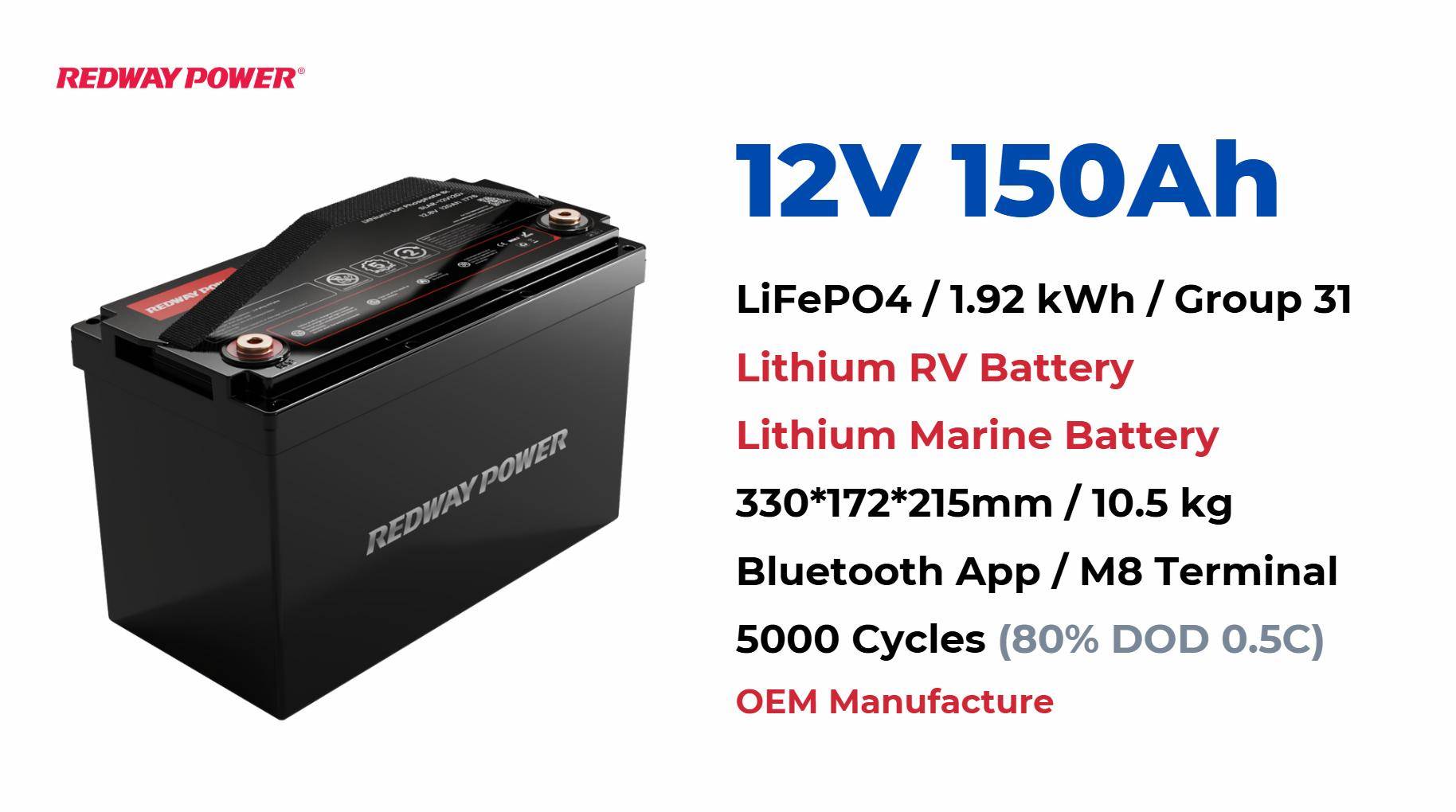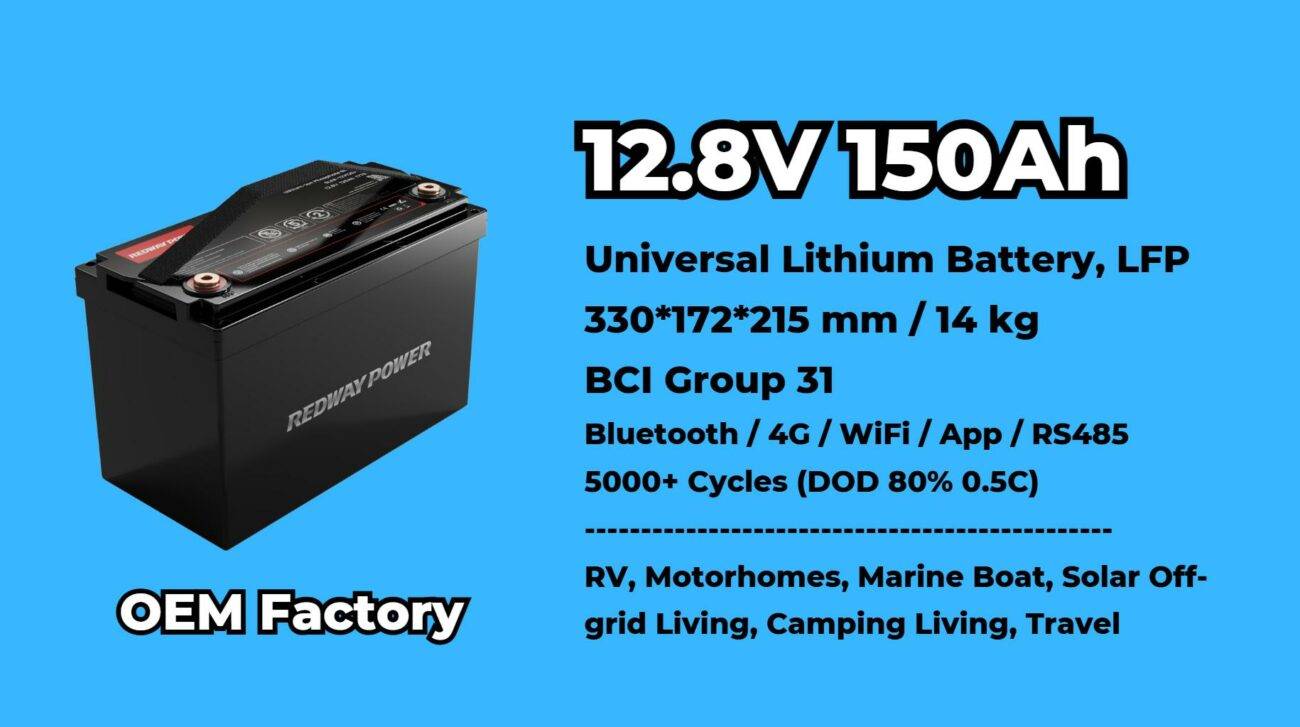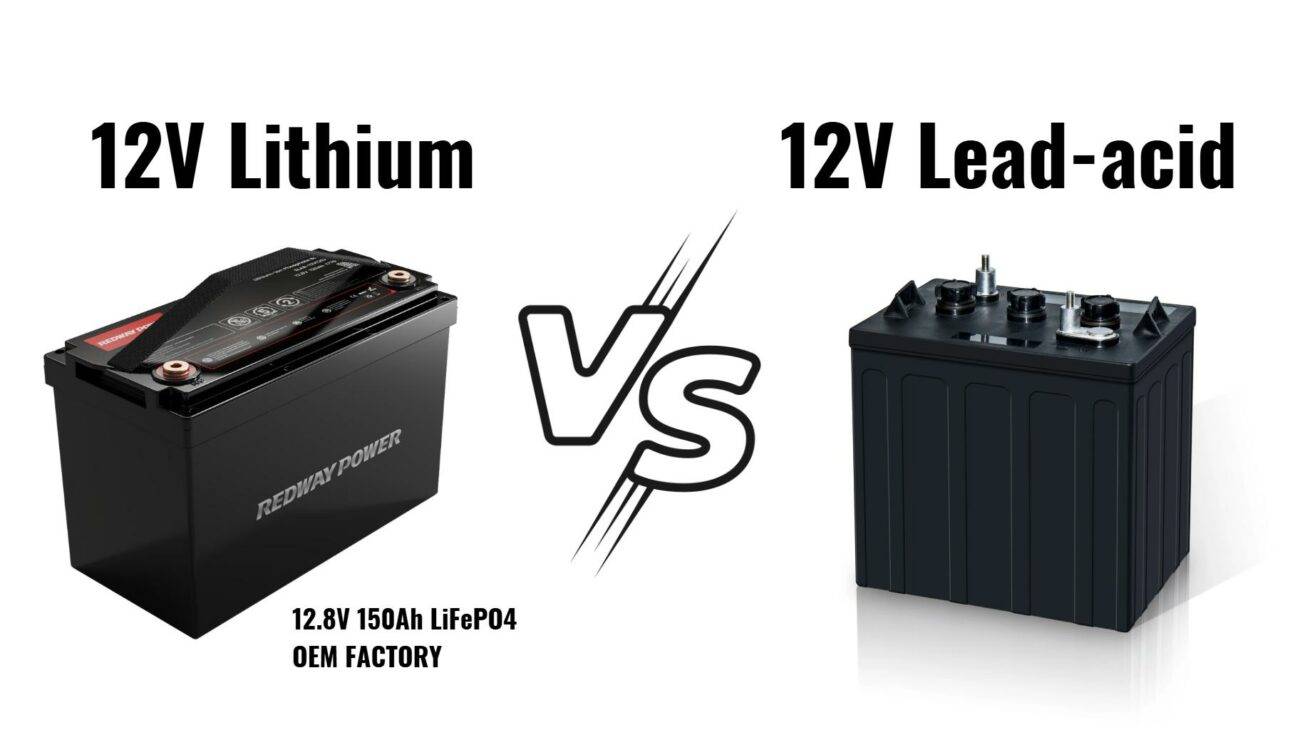- Forklift Lithium Battery
-
48V
- 48V 210Ah
- 48V 300Ah
- 48V 420Ah (949 x 349 x 569 mm)
- 48V 420Ah (950 x 421 x 450 mm)
- 48V 456Ah
- 48V 460Ah (830 x 630 x 590 mm)
- 48V 460Ah (950 x 421 x 450 mm)
- 48V 460Ah (800 x 630 x 600 mm)
- 48V 460Ah (820 x 660 x 470 mm)
- 48V 500Ah
- 48V 560Ah (810 x 630 x 600 mm)
- 48V 560Ah (950 x 592 x 450 mm)
- 48V 600Ah
- 48V 630Ah
-
48V
- Lithium Golf Cart Battery
- 12V Lithium Battery
12V 150Ah Lithium RV Battery
Bluetooth App | BCI Group 31
LiFePO4 Lithium
Discharge Temperature -20°C ~ 65°C
Fast Charger 14.6V 50A
Solar MPPT Charging - 24V Lithium Battery
- 36V Lithium Battery
- 48V Lithium Battery
-
48V LiFePO4 Battery
- 48V 50Ah
- 48V 50Ah (for Golf Carts)
- 48V 60Ah (8D)
- 48V 100Ah (8D)
- 48V 100Ah
- 48V 100Ah (Discharge 100A for Golf Carts)
- 48V 100Ah (Discharge 150A for Golf Carts)
- 48V 100Ah (Discharge 200A for Golf Carts)
- 48V 150Ah (for Golf Carts)
- 48V 160Ah (Discharge 100A for Golf Carts)
- 48V 160Ah (Discharge 160A for Golf Carts)
-
48V LiFePO4 Battery
- 60V Lithium Battery
-
60V LiFePO4 Battery
- 60V 20Ah
- 60V 30Ah
- 60V 50Ah
- 60V 50Ah (Small Size / Side Terminal)
- 60V 100Ah (for Electric Motocycle, Electric Scooter, LSV, AGV)
- 60V 100Ah (for Forklift, AGV, Electric Scooter, Sweeper)
- 60V 150Ah (E-Motocycle / E-Scooter / E-Tricycle / Tour LSV)
- 60V 200Ah (for Forklift, AGV, Electric Scooter, Sweeper)
-
60V LiFePO4 Battery
- 72V~96V Lithium Battery
- Rack-mounted Lithium Battery
- E-Bike Battery
- All-in-One Home-ESS
- Wall-mount Battery ESS
-
Home-ESS Lithium Battery PowerWall
- 24V 100Ah 2.4kWh PW24100-S PowerWall
- 48V 50Ah 2.4kWh PW4850-S PowerWall
- 48V 50Ah 2.56kWh PW5150-S PowerWall
- 48V 100Ah 5.12kWh PW51100-F PowerWall (IP65)
- 48V 100Ah 5.12kWh PW51100-S PowerWall
- 48V 100Ah 5.12kWh PW51100-H PowerWall
- 48V 200Ah 10kWh PW51200-H PowerWall
- 48V 300Ah 15kWh PW51300-H PowerWall
PowerWall 51.2V 100Ah LiFePO4 Lithium Battery
Highly popular in Asia and Eastern Europe.
CE Certification | Home-ESS -
Home-ESS Lithium Battery PowerWall
- Portable Power Stations
What Are the Safety Features of Modern 12V Lithium Batteries?
On September 29, 2024
Comments Off on What Are the Safety Features of Modern 12V Lithium Batteries?

Modern 12V lithium batteries are engineered with advanced safety features that enhance reliability and protect users. Understanding these mechanisms is essential for safe operation and maintenance.
1. Battery Management System (BMS)
The BMS is a critical component that monitors the battery’s voltage, current, and temperature. It plays a vital role in preventing overcharging, overdischarging, and overheating by shutting down the battery when unsafe conditions are detected.
- Voltage Monitoring: Ensures that each cell operates within a safe voltage range.
- Current Limiting: Prevents excessive current that could lead to battery damage.
- Temperature Control: Continuously monitors temperature to avoid overheating and potential thermal runaway.
2. Separator Technology
The separator is designed to prevent direct contact between the anode and cathode, significantly reducing the risk of short circuits.
- Porous Material: Allows ionic conductivity while preventing physical contact between electrodes.
- Thermal Shutdown Capability: Melts at high temperatures to disconnect the battery and prevent thermal runaway.
3. Cell Design
Different cell designs—such as cylindrical, prismatic, and pouch—offer varying safety characteristics.
- Pressure Vents: These are crucial for the safe release of gas buildup, preventing battery rupture.
- Rigid Cases: Protect cells from physical damage and external impacts, enhancing overall durability.
4. Charging Circuitry
The charging circuitry includes several safety features to ensure safe operation:
- Charge Rate Limitation: Controls the charging rate to prevent overcharging.
- Manufacturer-Specific Chargers: Using chargers recommended by the manufacturer is essential for compatibility and safety.
5. Thermal Management Systems
Many modern lithium batteries include thermal management systems that help regulate temperature during operation and charging, further enhancing safety and performance.
6. Certifications and Quality Assurance
Batteries with certifications, such as UL certification, comply with rigorous safety standards. Purchasing from reputable manufacturers ensures adherence to quality and safety protocols.
7. Handling and Storage Guidelines
Proper handling is crucial for maintaining battery safety:
- Avoid physical damage (punctures or impacts).
- Store in a cool, dry place away from heat sources.
- Maintain a storage state of charge between 30% and 50% to minimize risks.
8. Additional Safety Mechanisms
Modern lithium batteries may also include features such as:
- Pressure Relief Devices: These release gas in the event of excessive pressure buildup.
- Positive Temperature Coefficient (PTC) Resistors: Function as fuses to prevent high current surges, enhancing safety.
Conclusion
The integration of these safety features in modern 12V lithium batteries significantly enhances their reliability and minimizes risks associated with battery use. By understanding these mechanisms, users can ensure safer operation and maintenance of their lithium battery systems. For high-quality lithium solutions, contact Redway Power, your trusted partner in innovative energy storage.
















